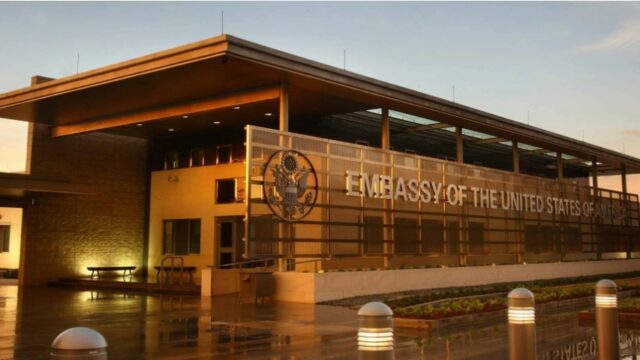FAQs
What is a U.S. Consulate?
The United States has only one embassy and ambassador in the capital of a foreign country. In large countries, the United States may have several…

An embassy is an official headquarters for U.S. diplomats and government representatives serving in a foreign country.
Embassies are generally led by an ambassador, who is the U.S. President’s representative to the host country. An embassy is usually located in a country’s capital city, but it may have branches (known as consulates) in other cities.
“Geography has made us neighbors. History has made us friends. Economics has made us partners, and necessity has made us allies.”
– John F. Kennedy

A large embassy can have many buildings. The main embassy building is called the chancery, and additional buildings are called annexes. As the public faces of the United States in host countries, embassies are often architectural works of art. In some countries, American staff may live on the embassy compound for safety.
U.S. embassies and consulates abroad, as well as foreign countries’ embassies and consulates in the United States, have a special status. While the host government is responsible for the security of U.S. diplomats and the area around an embassy, the embassy itself belongs to the country it represents. Representatives of the host country cannot enter an embassy without permission. An attack on an embassy is considered an attack on the country it represents.
The ambassador is also known as the chief of mission. They are the highest-ranking diplomat to the host country and are the personal representative of the President. They are comparable to a CEO of a corporation and must be a strong leader and a good manager. The ambassador’s residence is often used for official functions. Its public areas may be decorated with art on loan from American museums.
Ambassadors are supported by a deputy, known as the deputy chief of mission, and a team of U.S. Foreign Service Officers and specialists from the Department of State. Representatives from other U.S. agencies also support the ambassador. Other agencies found at U.S. embassies can include the U.S. Agency for International Development (USAID), or the Departments of Defense, Commerce, Justice, Homeland Security, and Agriculture. No matter their agency, all employees work under the direction of the ambassador.
The primary purpose of an embassy is to assist American citizens who travel to or live in the host country. U.S. Foreign Service Officers also carry out duties related to advancing U.S. interests abroad. Embassy staff members interact with representatives of the host government, local businesses, nongovernmental organizations, the media, educational institutions, and private citizens. In these interactions, they increase mutual understanding of the United States and its policies. Embassy staff also analyze the political and economic situation in the host country. Their findings may help U.S. businesses find partners and customers.
If requested by the host country, U.S. embassy staff may train the host government’s police and military to better support the country’s security efforts.
The U.S. embassy also sponsors educational, professional, and cultural exchanges. Knowledge exchanges such as these introduce emerging and established leaders to the United States. In the long term, exchanges promote ties between U.S. and foreign students, academics, scientists, entrepreneurs, and political, religious, and civil society figures.
Finally, U.S. Foreign Service Officers at the embassy interview citizens of the host country who wish to travel to the United States for business, education, or tourism purposes.
Many Americans work at embassies and consulates to handle all sensitive roles relating to U.S. foreign policy and national security. However, most of the embassy staff is from the host country. These employees are known as Locally Employed Staff. These employees are essential to the success of any embassy. Locally Employed Staff know the local culture and language, have essential skills relevant to the region, or are well-connected to the foreign government and civil society leaders.
